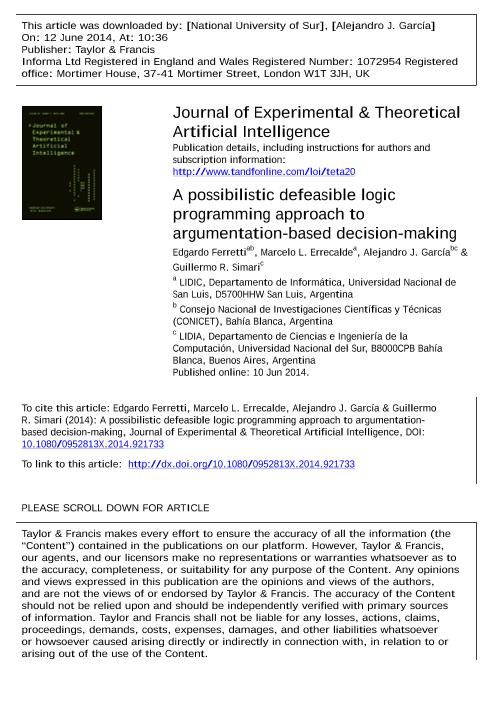Mostrar el registro sencillo del ítem
dc.contributor.author
Ferretti, Edgardo
dc.contributor.author
Errecalde, Marcelo
dc.contributor.author
Garcia, Alejandro Javier

dc.contributor.author
Simari, Guillermo Ricardo

dc.date.available
2017-02-02T20:54:38Z
dc.date.issued
2014-06
dc.identifier.citation
Ferretti, Edgardo; Errecalde, Marcelo ; Garcia, Alejandro Javier; Simari, Guillermo Ricardo; A Possibilistic Defeasible Logic Programming Approach to Argumentation-Based Decision Making; Taylor & Francis; Journal Of Experimental And Theoretical Artificial Intelligence; 26; 4; 6-2014; 519-550
dc.identifier.issn
0952-813X
dc.identifier.uri
http://hdl.handle.net/11336/12390
dc.description.abstract
The development of symbolic approaches to decision-making has become an evergrowing research line in artificial intelligence; argumentation has contributed to that with its unique strengths. Following this trend, this article proposes a general-purpose decision framework based on argumentation. Given a set of alternatives posed to the decisionmaker, the framework represents the agent’s preferences and knowledge by an epistemic component developed using possibilistic defeasible logic programming. The reasons by which a particular alternative is deemed better than another are explicitly considered in the argumentation process involved in warranting information from the epistemic component. The information warranted by the dialectical process is then used in decision rules that implement the agent’s general decision-making policy. Essentially, decision rules establish patterns of behaviour of the agent specifying under which conditions a set of alternatives will be considered acceptable; moreover, a methodology for programming the agent’s epistemic component is defined. It is demonstrated that programming the agent’s epistemic component following this methodology exhibits some interesting properties with respect to the selected alternatives; also, when all the relevantinformation regarding the agent’s preferences is specified, its choice behaviour coincides with respect to the optimum preference derived from a rational preference relation.
dc.format
application/pdf
dc.language.iso
eng
dc.publisher
Taylor & Francis

dc.rights
info:eu-repo/semantics/openAccess
dc.rights.uri
https://creativecommons.org/licenses/by-nc-sa/2.5/ar/
dc.subject
Non-Monotonic Reasoning
dc.subject
Argumentation
dc.subject
Possibilistic Defeasible Logic
dc.subject
Programming
dc.subject
Decision Making
dc.subject.classification
Ciencias de la Computación

dc.subject.classification
Ciencias de la Computación e Información

dc.subject.classification
CIENCIAS NATURALES Y EXACTAS

dc.title
A Possibilistic Defeasible Logic Programming Approach to Argumentation-Based Decision Making
dc.type
info:eu-repo/semantics/article
dc.type
info:ar-repo/semantics/artículo
dc.type
info:eu-repo/semantics/publishedVersion
dc.date.updated
2017-02-02T14:07:38Z
dc.journal.volume
26
dc.journal.number
4
dc.journal.pagination
519-550
dc.journal.pais
Reino Unido

dc.journal.ciudad
Londres
dc.description.fil
Fil: Ferretti, Edgardo. Universidad Nacional de San Luis. Facultad de Ciencias Físico Matemáticas y Naturales. Departamento de Informática. Laboratorio Investigación y Desarrollo en Inteligencia Computacional; Argentina
dc.description.fil
Fil: Errecalde, Marcelo . Universidad Nacional de San Luis. Facultad de Ciencias Físico Matemáticas y Naturales. Departamento de Informática. Laboratorio Investigación y Desarrollo en Inteligencia Computacional; Argentina
dc.description.fil
Fil: Garcia, Alejandro Javier. Consejo Nacional de Investigaciones Científicas y Técnicas. Centro Científico Tecnológico Bahia Blanca; Argentina. Universidad Nacional del Sur; Argentina
dc.description.fil
Fil: Simari, Guillermo Ricardo. Universidad Nacional del Sur; Argentina. Consejo Nacional de Investigaciones Científicas y Técnicas. Centro Científico Tecnológico Bahia Blanca; Argentina
dc.journal.title
Journal Of Experimental And Theoretical Artificial Intelligence

dc.relation.alternativeid
info:eu-repo/semantics/altIdentifier/url/http://www.tandfonline.com/doi/abs/10.1080/0952813X.2014.921733
dc.relation.alternativeid
info:eu-repo/semantics/altIdentifier/doi/http://dx.doi.org/10.1080/0952813X.2014.921733
Archivos asociados
